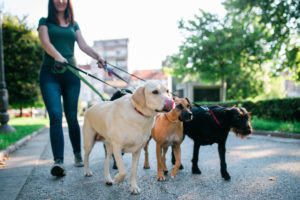
New apps such as Wag! and Rover match dog owners with people willing to perform on-demand dog walking, sitting, or boarding. They purport to operate similarly to the way in which ride-sharing apps connect riders and drivers.
The companies running these apps do pre-screen and conduct a background check of their dog walkers. But they don’t conduct similar checks on the dogs or dog owners. In this respect, dog walkers are like the people who drive for Uber or Lyft. The dogs and their owners are like passengers. If the walker thinks the dog or owner seems shady they can turn down the “ride.”
But what happens when a dog walker accepts an assignment and Fido turns out not to be as friendly as the owner claims?
Wag! and Rover deny liability
According to Wag! and Rover, it’s not their problem. Their position is that they are simply arranging a referral for a walker who is an independent contractor. From their point of view, owners are 100% responsible for injuries sustained by a dog walker.
But is that really the case?
The answer is that it may not be that simple.
“Strict liability” versus “one-bite” rule
States generally have one of two types of laws that govern dog bite liability:
In a strict liability state, an owner assumes full responsibility for his/her animal – even if the animal is friendly.
A one-bite state, on the other hand, is just what it sounds like. An owner is not liable for a dog bite unless the dog has bitten someone before (or displayed other aggressive behavior).
Exception: the “Veterinarian’s Rule”
But even in a strict liability state, there is an exception. Known as the “Veterinarian’s Rule,” it is a type of “assumption of the risk” law. It provides that someone who works professionally with dogs assumes the risk of being bitten unless:
- The dog has bitten someone or shown aggressive tendencies in the past,
- The owner knows or should have known about such behavior, and
- The owner failed to warn the professional.
The bottom line is that whether in a strict liability or a one-bite state, someone who is regularly paid to walk dogs generally assumes the responsibility for a bite.
When the dog has a known history of biting
But what if the company sending the walker out knew the dog had a history of biting?
In this case, there is a strong argument to be made the app company owes a legal duty of care to the dog walker.
Companies such as Wag! and Rover are likely to fight this, however.
Let’s take a look at what we know:
Wag’s contract with dog owners does not require disclosure of aggression
Wag’s Terms of Service contract for dog owners contains the following representations and warranties:
“Pet owners warrant and agree that: (1) your pets are free from fleas, ticks, and other pests; and (2) you will have your pets fully vaccinated and up to date on all forms of preventative medicine prior to receiving services from a Pet Care Provider.”
There is no representation that the dog is friendly. There is no representation that the dog has not bitten or attacked someone in the past.
Potential customers are not asked if their animal is friendly (or even if it has been vaccinated against rabies).
According to people who have walked for Wag!, there is limited training available to walkers. During the training, the company emphasizes that a dog walker must determine whether a dog is dangerous.
Limited information provided to dog walkers
But walkers must also accept a job before they are given any detailed information about the animal –information that comes from the animal’s owner. A slight individual might accept a job only to find out that the animal is a 90-pound Rottweiler who pulls on the leash.
The company also does not appear to have an area on its website in which walkers can post about negative experiences with an animal or owner. It does not appear to pass any such notices on to the people who accept assignments from it. (We attempted to call both the customer service line and the walker hotline to confirm this, but even after holding for over 15 minutes on each, no one answered).
Companies like Wag! and Rover do more than merely serve as a classified section that connects dog walkers and owners. They actively screen their walkers. They provide training and support. They cut checks to them.
The apps also help their dog walkers create a profile. Rover’s website notes that its “profile experts” may ask walkers “to modify a few things to make your profile the best it can be.”
So these companies are acting more like temp agencies than an online classified section. It is likely they have a duty to prevent harm to the people they send out on assignments.
Bitten while walking someone’s dog? Call an experienced dog bite lawyer
In short, a dog walker’s best bet for recovering damages for dog bites will usually be to seek redress from the animal’s owner.
But this will provide proof that the animal had a history of biting or aggression. And if a company such as Wag! or Rover knew it but didn’t disclose it, the company may be liable.
An experienced dog bite attorney can help you determine how to get compensation for dog bite injuries in your state.
For more information, please see our article “Who is liable when a dog bites a dog walker in California?”
Or call us to discuss your case with a dog bite lawyer.

